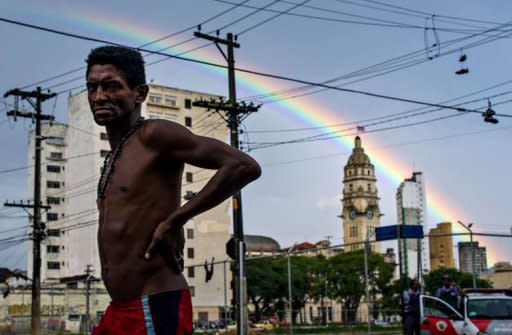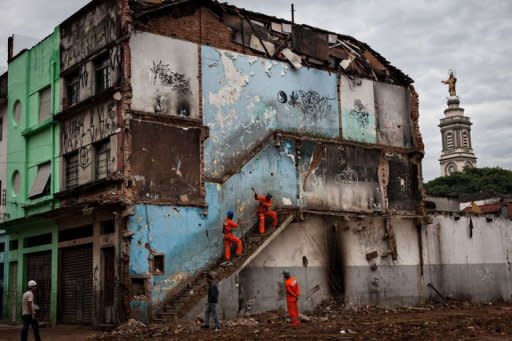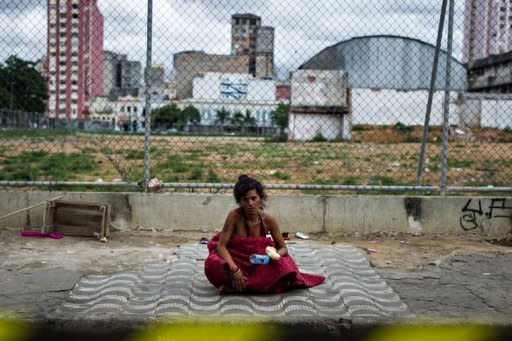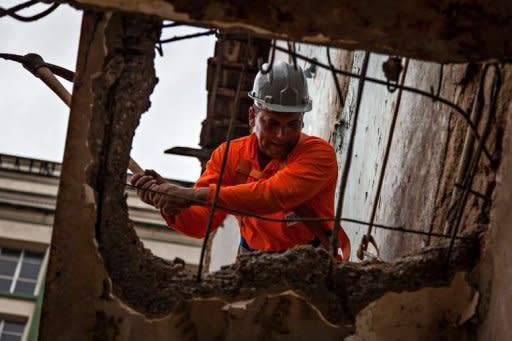Police crackdown on Sao Paulo's drug users sparks protest
A muscular police operation to evict drug users from central Sao Paulo is triggering howls of protest from rights groups who say the crackdown's aim is to sanitize the area for developers keen to boost property value. Some 300 military police have been deployed in "Cracolandia," a 10-block area of dilapidated buildings in the heart of Brazil's largest city, to shut down an open-air crack (cheap cocaine derivative) market and remove hundreds of addicts, squatters and drug dealers. The operation, which began in early January, came after the Brazilian government last month announced plans to combat a nation-wide "crack epidemic" with a $2.2 billion plan focusing on prevention, medical treatment and a crackdown on trafficking,. Between 2003 and 2011, the number of cases of "chemical dependency" in Brazil has increased tenfold, hitting groups and regions which previously had not been affected, according to Health Minister Alexandre Padilha. Experts say that Latin America's economic powerhouse, with a total population of 190 million people, has an estimated 1.2 million crack users. In Sao Paulo, home to around 20 million, police initially used tear gas and rubber bullets to disperse groups of addicts from the heart of crime-ridden Cracolandia. But after widespread criticism, they eased their heavy-handed tactics, and merely set up road blocks at key intersections, forcing the addicts to roam around aimlessly in adjacent streets. Saturday, 43 groups representing social workers, human rights and homeless advocates held an impromptu "churrasco" (barbecue) in the area to feed the addicts and denounce what they called "a violent attempt to sanitize the area" as well as "the criminalization of poverty." Eduardo de Oliveira, a haggard-looking addict, said he has no job, sleeps on the streets and uses up to 30 crack rocks a day, each costing between $3 and $10. Where does he get the money to eat and support his habit ? "I steal. I pick food from the trash," the 35-year-old said. But not all among Cracolandia's floating street population estimated at 2,000 are drug addicts. Maria Solange Machado, a former nurse who was fired from the state health services after she developed mental problems, said she has been living in the streets since 2005 because she can't find work and can't afford to pay rent. "These people have been abandoned by the state. Many of them are not drug addicts. You have people who have been fired from their jobs, people with mental problems," she told AFP. "There are not enough shelters or centers to care for them." Anderson Lopes Miranda, coordinator of the Movement of Street People, said an estimated 20,000 people are homeless and live in Sao Paulo streets. "And there are about one million of them (homeless) across Brazil," he added. Father Julio Lancelotti, of the Sao Paulo archdiocese, said the church was doing its part to help. "We have some 150 people (addicts and homeless people) in our shelters scattered across the city," he added. But despite the protest, police vowed to maintain their occupation of the area. "They (critics) can say whatever they want," Lieutenant Flavio Martinez told AFP. "The objective of the military police is to combat trafficking and drug use and to reduce the number of robberies." And he said aid there was "no time limit" for the operation. But several of the homeless said the police should stop harassing them and instead go after the big traffickers operating in the city's slums. One drug addict who would only identify him as Sebastiao said crack dealers were operating from nearby dilapidated buildings with the full knowledge of the police. "The police are protecting them," he charged. "While it is important for the state to stop the proliferation of crack, the priority should be to meet the social needs of this population. They need shelters, medical attention," said Kennedy Ferreira, a sociologist. Critics said the aim of the police operation is to expel the addicts and other squatters to enable developers to revitalize the area as the city spruces up its image ahead of the 2014 World Cup and 2016 Summer Olympics which Brazil will host. "It's part of the city's 'Nova Luz (New Light)' to boost property value in the area," said Vinagre. The project, billed as one of the city's most promising investment opportunities, includes the expropriation and demolition of hundreds of buildings, many of them old skyscrapers from the past century that are in a state of advanced disrepair. Meanwhile volunteers wearing the yellow t-shirts of the Baptist missionary group Jesus Transforma seek to rescue the addict population by offering shelters and food in exchange for conversion to their faith. "We want to turn Cracolandia into Christolandia," volunteer Washington Luis Alvaranga told AFP.







